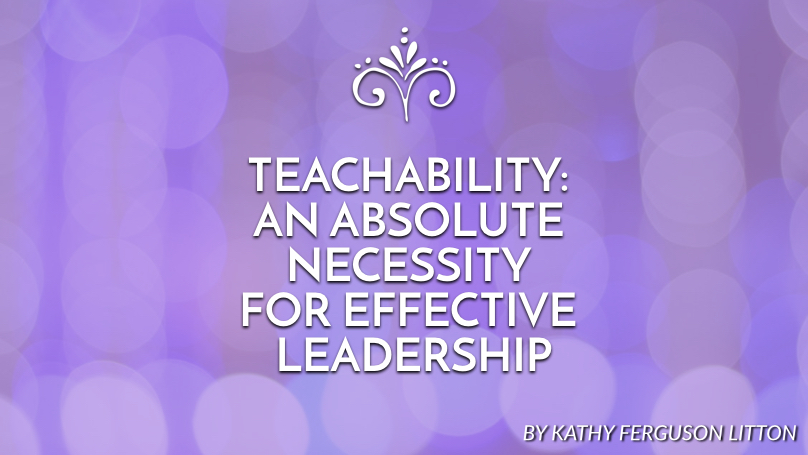There is a noticeable common thread in most successful people—they are teachable. And correspondingly the opposite is true—the unteachable are stunted, ineffective or lack measurable success.
Being teachable raises the ceiling in all areas of our lives—intellectually, relationally, emotionally, financially, socially and spiritually. If we are unteachable, we will miss full potential in our homes, work and relationships.
And yes, ministry leaders, if we are unteachable, we will fall short of our greatest kingdom impact. Leaders should be learners. In fact, with the swift pace of change in society, culture, technology, information and globalization, the urgent need to be teachable has never been higher in my lifetime.
“The strongest leaders I know are ravenous learners.” — Sharon Hodde Miller
Failure to be teachable in relationships will short circuit our capacity to love, lead and influence people.
Failure to be able to understand, engage and interact well with a rapidly changing world is the demise of our influence.
Failure to be teachable spiritually will stunt our maturity as disciples, which will also diminish our testimony.
What does it look like to be unteachable?
- Fails to receive or learn from criticism
- Refuses to ask questions or try anything that might make them appear uninformed or inexperienced.
- Remains only in safe, low-risk environments that won’t require change or learning
- Won’t risk personal comfort in relationships, work, ministry, study or culture, always choses familiar and safe
- Will not seek guidance from more seasoned, experienced people
- Cannot accept correction either at work, marriage or in spiritual issues
- Is not driven by curiosity or desire to be a learner
- Is passive, unengaged in learning environments—doesn’t take note or ask questions
- Will not expose themselves to thoughts, history or experiences that will challenge their existing perceptions, practices or prejudices
Three characteristics of a teachable person:
- A teachable person keeps a humble heart.
“Do you see a man who is wise in his own eyes? There is more hope for a fool than for him” (Proverbs 26:12).
Teachable people approach life with an understanding that they can learn from anybody regardless of that person’s state, status or station in life. Such a spirit involves humility, and such humility keeps the door open for knowledge and truth to find a lodging place in our hearts. We demonstrate humility when we learn from criticism or seek the counsel of others. If pride prevents you from asking questions to get clarity, you are not teachable.
- A teachable person is able to learn in failure.
“And you say, ‘How I hated discipline, and my heart despised reproof! I did not listen to the voice of my teachers or incline my ear to my instructors'” (Proverbs 5:12-13).
Jokingly, I have carried around a manila folder when teaching pastor’s wives with label that read, “Things I Learned the Hard Way.” Yet it is no joke. Failure is one of our most teachable moments—we cannot afford to miss those lessons. Most of the profound lessons that have stuck with me the most are ones my own failures taught me. When we understand correction is for our good, we begin to see it as a helpful learning experience and not something we run from.
- A teachable person maintains a high curiosity quotient.
Even simple curiosity drives a great deal of learning. God uses human curiosity to expand our knowledge and understanding. And with Google the resources to learn, research and explore is one click away. Curious people pursue such research. Presently, podcasting is a popular tool with easy-to-access content on every subject imaginable. Teachable people are curious about unfamiliar culture or perspectives. They place themselves intentionally among people, events, cultures and thoughts that will challenge their status quo.
“I have no special talent I am only passionately curious.” — Albert Einstein
We are living in a unique time. Society is rapidly changing—the speed of change demands that we learn and absorb cultural transformation around us—or become irrelevant. Do not think that being relevant is just an attempt at “coolness,” it is far bigger than that. It is working to understand the world in the way it actually is presently in order to interact with that world effectively. There is nothing noble or spiritual about remaining irrelevant. This is a pretty strong statement but we when intentionally chose to stay irrelevant we are really saying “I don’t care about the world around me as it is today.” That, my friends, is selfishness.
“Relevance is a tool; gospel proclamation is the goal.” — Ed Stetzer
For those who are serious about effectively living life on mission—here are three teachable areas that should be a priority.
Genuine spiritual growth
I am talking about our own personal discipleship process. Everything in our lives flows out of the depth and richness with our relationship with Jesus, His Word and the power of the Holy Spirit in us—our character is shaped here, our worship is birthed here and life-long sanctification happens here.
If we are going to be teachable this is the number one area of consideration. Why? In a day of skepticism of Christianity and its leaders, these two things are true:
- Our genuine, personal spiritual reality authenticates our faith and makes us believable.
- Our genuine ongoing transformation validates the power of the gospel.
No one, at any age or supposed stage of spiritual maturity should ever coast in the area of genuine spiritual vitality. My intimacy with God effects my impact for God.
I loved this verse when I was younger, but now that I am older it is my daily prayer, “They shall still bear fruit in old age; They shall be fresh and flourishing.” Psalm 92:14
Cultural awareness and understanding
We need to demonstrate cultural humility which means being willing to learn of another’s culture and being willing to recognize our common humanity despite our differences.
Two reasons we need cultural humility:
- The world around us growing increasingly more secular, more global and more ethnically and religiously diverse. To interact with the world as it is we must learn and understand society around us as it is—not merely long for “the way things used to be”.
- We desperately need to share the gospel and plant churches in places where the above culture dominates. This will require our ability to know, understand and relate to these contexts in order to love, serve and share Christ.
“I cannot love my neighbor unless I understand him and the cultural world he inhabits. Cultural literacy—the ability to understand patterns and processes of everyday life—is an aspect of obeying the law of love.” — Kevin Vanhoozer
Developing a high gospel IQ
Pastor’s wife and IMB leader Lori McDaniel recently coined the concept of “Gospel IQ” with this definition: “The ability to apply the gospel in daily tasks by identifying and harnessing opportunities to share the gospel effectively in situations characterized by spiritual diversity.”
What would a high gospel IQ look like? It would be heightened awareness of gospel-sharing moments combined with ability to communicate an understandable gospel message to diverse hearers driven by power of the Holy Spirit. Which means we must first learn about the worldview, cultural bent and religious persuasion of the people around us.
Even in the country we call home, we must be able to make a never-changing gospel understandable in our increasingly secular society. We need to acquire the ability to communicate a vibrant, Biblical gospel with a lens of understanding diverse worldviews.
A woman with a genuine teachable spirit is a humble learner and leans into learning for the glory of God and the sake of the gospel.
Read More: Twelve Ways to Become More Teachable.
Podcast: Teachability
Published September 7, 2017



